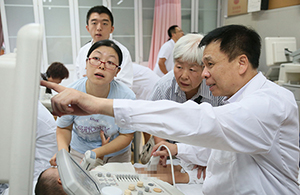People must not be punished for trying to defend their rights
(China Daily) Updated: 2016-08-11 08:01
 |
|
A woman with a baby selects imported infant formula in a Beijing supermarket. [Photo/China Daily] |
GUO LI from South China's Guangdong province was sentenced to five years in prison in 2010 for trying to allegedly "extort" money from two companies to help his daughter whose kidneys were damaged after eating their melamine-containing dairy products. On his release he appealed to clear his name. On Aug 1, after a review of the case, he was declared innocent. China Youth Daily commented:
When his child suffered, Guo asked the companies for compensation, and signed a document relinquishing his right to any further claims. But since his child continued to suffer, he asked for more money to help pay for her treatment, at which point the companies called the police.
In court he was found "guilty" of extortion and sent to prison.
But extortion means to threaten other people for personal gain, yet in the whole case there is no evidence showing Guo, an ordinary citizen, tried to threaten the two powerful companies.
The court said that Guo threatened the companies by saying he "might tell his story to the media", but it is Guo's legal right to do so. He has the right to tell the media what happened to him.
If that is a crime, many people would be guilty of it and there would hardly be any journalism.
More importantly, people extort for profit. Guo was seeking help because his daughter suffered kidney problems after taking dairy products produced by the two companies that contained melamine. When the court sentenced him to five years in prison, did it mean to discourage people from defending their legal rights?
Some argue that Guo signed an agreement giving up his right to further compensation. Yet whether such an agreement is legally binding is still being debated. Even if it is, that is a civil dispute over the breaking of a contractual agreement between Guo and the two companies, not a criminal case.
The law is to protect people's legal rights. If the police and judiciary punish individuals for defending their legal rights, that is against the spirit of law and will only hurt social justice.

In our daily life, more and more loanwords appear and change our habits in Chinese expression. Loanwords sound very similar with their original English words, and the process of learning them is full of fun to foreign students.

It has been a while since I've contributed to this Forum and I figured that since now I am officially on summer holiday and another school year is behind me I would share a post with you.










